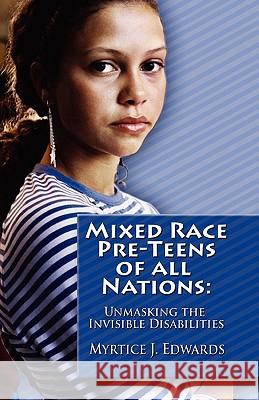Mixed Race Pre-Teens of All Nations: Unmasking the invisible disabilities » książka
Mixed Race Pre-Teens of All Nations: Unmasking the invisible disabilities
ISBN-13: 9781456322960 / Angielski / Miękka / 2010 / 152 str.
Mixed race people are always told what they should identify as. It's very difficult to fit neatly into America's idea of "race." Some mixed race individuals battle others issues other than race such as: homelessness, racial ambiguity, ADD, ADHD, illegal immigration, and/or being the first generation to come to America. These issues are not considered a disability, but often it feels like one to the person who is going through it. For the purpose of this book, I will use the word disability to describe how these "unseen" issues can impair normal behavior. It is only used to explain the issues that people may feel about themselves. By definition, if a medical condition does not impair normal activities, then it is not a disability. The term "invisible disabilities" usually refers to the way that people may feel about themselves. When most people think of a disability, they picture in their minds a person with a visible, obvious impairment. Some people with visual or auditory impairments who do not wear glasses or hearing aids may not be obviously impaired. Some may wear contacts, wear an ocular prosthesis or artificial eye, or have cochlear implants (a surgically implanted electronic device that provides a sense of sound to a person who is profoundly deaf or severely hard of hearing) instead. Just because no one can see your "disability" doesn't mean it doesn't exist. Invisible disabilities can affect you just as much as a "visible" disability, like being blind or an amputee. I hope this book will help to unmask society's characteristics of people who think of their race or ethnicity as a disability. Hopefully they will embrace who they are-their unique self. American society puts extreme value on image (how you look) and who you know.
Zawartość książki może nie spełniać oczekiwań – reklamacje nie obejmują treści, która mogła nie być redakcyjnie ani merytorycznie opracowana.











